Dialectical Thinking
I used to think that mindfulness was all about emptying my mind of thoughts, to create an internal space of nothingness, that would then cause me to feel peace and tranquility all the time. Man was I deluded in that belief, as when I tried to practice things from this point of view, I quickly found that I was incapable of even focussing my mind for more that a second or two. This would activate my own internal critic that would go off on a narrative of beating me up about my inability to be mindful, and send me down a rabbit hole of anger, an adult version of a temper tantrum, that would usually see me storm off in a child like manner, labelling the practice as stupid, and refusing to do it again in the future.
As I later discovered, this belief about the way I was supposed to practice mindfulness was completely unattainable, as I had never even tried to sit with my internal world for any length of time before. Having the expectation that I could empty my mind was an unrelenting standard, that actually meant I was destined to fail before I even started, so this was the first schema that I had to recognize, and work on changing. Once I realised that the practice of mindfulness meant noticing how full your mind was, without judging these things in any way, it started to make sense how this could be helpful in my recovery.
When I entered the world of DBT and the multiplistic personality system, it blew my mind to realize how unaware I previously was, and I practice my recovery from this new perspective, all the time, even to this very day. Mindfulness is all about slowing things down so I can see the story that has activated my parts, causing a desire to react in an emotional way. This reaction is tied to a particular schema, and usually creates a childhood re-enactment to play out in my current situations, that keeps me trapped in feelings of sadness, loneliness, guilt, and shame. In order to see these stories, I have to calm my mind enough to unblend from the part that is holding onto the negative emotional schema that has me seeing the world from a particular point of view.
One of the simplest ways to calm your mind is something that you’re already doing naturally every second of the day, breathing. Everyone breathes, we have to in order to stay alive, the problem that I had was I didn’t know how to breathe in a way that was supportive of my mental and physical well being. When we feel intense emotions, it is common for people who have an emotional sensitivity, whether this is genetic, or caused by a history of trauma, to jump into a state of fight or flight. When in this state, all bets are off. We go into automatic reactions that are governed by the parts that you are blended with, parts that are actually trying to protect you in some way, but usually tending to keep you stuck in unwanted emotions that you were trying to avoid in the first place.
Learning how to breathe from a mindful perspective builds our ability to instinctively, and automatically, slow things down. It opens up the possibility of choice in behavioural patterns that were previously unregulated and probably as automatic as breathing itself. Being mindful of your breathing is as easy as it sounds, but often a difficult thing to do, particularly if you’ve never tried to do it before. Mindful breathing is a very powerful yet underutilized tool that, when practiced on a regular basis, multiple times a day, will definitely help you to calm your experience of really intense emotions, and bring awareness to being in the present moment.




